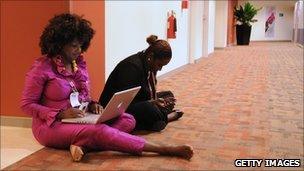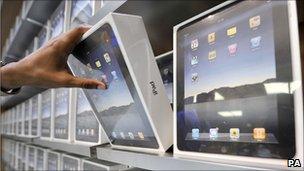Has mobile working come of age?
- Published
Has mobile working come of age?
I call it my lifeline," says Fernando Ferrufino, showing off his new 4G datacard.
The Washington DC-based real estate agent has just started using the latest mobile broadband system and says the increased speed makes a big difference to how he works.
"It is definitely noticeably faster than 3G," he notes.
Mr Ferrufino is busy ploughing through his e-mail inbox, while listening to voicemail messages on speakerphone.
His office this morning is a comfortable two-bedroom apartment that one of his clients hopes to buy. Later in the day, he may find himself working from the passenger seat of his car.
Times have changed, he explains, since he first started in the property business. Agents would return to their office several times a day to collect documents, keys and catch-up on paperwork.
Mr Ferrufino's employer, Redfin, like many companies, is facing the challenge of picking the right hardware and software solutions to equip its staff for remote working.
A deluge of new devices, including smartphones and tablets, has brought fresh challenges for corporate technology managers.

Surveys show that allowing staff to work remotely improves productivity
A 2010 study, carried out by Cisco systems, found that 45% of IT professionals were unprepared or struggling to implement mobile workforce systems.
However, the need to get it right, from both a staffing and productivity standpoint, is apparent.
The same Cisco study found two-thirds of employees desire work flexibility, with more than half of respondents claiming they would take a lower-paying job that offered more flexible working.
Yet responses to the demand for mobile working are mixed, according to Prof Kevin Rockmann, of George Mason University.
"I think organisations are struggling to know which technologies to support," he said.
"A lot of people that I know have multiple cellphones or laptops. They have an iPad that is theirs and one that belongs to work.
"How does the organisation decide what it is going to take care of?" he added.
Trying to set broad policies is less effective than ad-hoc solutions, according to Prof Rockmann.
"Let your employees innovate and use the technologies they want to use. Help them do that and don't restrict," he said.
Security concerns
The most significant barrier to allowing staff to drive innovation and bring their own mobile devices of choice is security.
Among IT decision makers, surveyed by Cisco Systems, 57% rated security as the biggest challenge to enabling remote working.
Traditionally, companies have chosen to issue staff with customised, secure laptops.
In many cases, employees find their user experience is severely compromised by the many layers of protection needed to safeguard corporate networks.
One potential solution, being put forward by security firms such as Citrix, is to host office software in the cloud.
Instead of running locally on the user's machine, they log on to a virtualised work environment through dedicated applications or a web browser.
"We really can provide access to all that information while keeping it within our infrastructure - behind the firewall, if you will," says Tom Simmons, area vice-president, US Public Sector at Citrix.
New devices
Mr Simmons explains that such an approach allows staff to access a common user interface from a wide range of devices.
Among those is the seemingly ubiquitous iPad.

Three quarters of companies say they plan to make use of the iPad
According to research by Forrester, three quarters of companies in Europe and North America are already using or planning to make use of Apple's handheld device.
In some cases, the iPad will displace existing laptops. However, the study found that many companies plan to make use of it for tasks where no electronic device is currently involved.
Supporters of the cloud-based model claim it is the best way to deal with an ever-changing hardware market.
"It is that ability for the technology innovators on the device side to keep coming out with new capabilities, new formats, and yet not put the pressure on the IT organisations that have to service the user community," said Tom Simmons.
Beyond the technical challenges, there remain simpler, more human, obstacles to mobile working.
Lazy workers
For some, there is still a stigma attached to those colleagues who shun the office, with a perception that "working from home" is shorthand for "taking it easy".
"You find a lot of middle and upper managers don't feel comfortable letting people out of their sight," says Prof Rockmann.
The reality, he points out, is quite different: "When employees get more autonomy, they work harder, they are more grateful, they'll stay connected and you can be even more productive."
That assertion is supported by the boss of mobile estate agent Fernando Ferrufino.
"I can see exactly what they are doing," said Karen Krupshaw, market manager for Redfin.
"I am very connected real-time through some wonderful systems that allow me to understand exactly what my agents are doing.
"It's not a concern at all," she said.